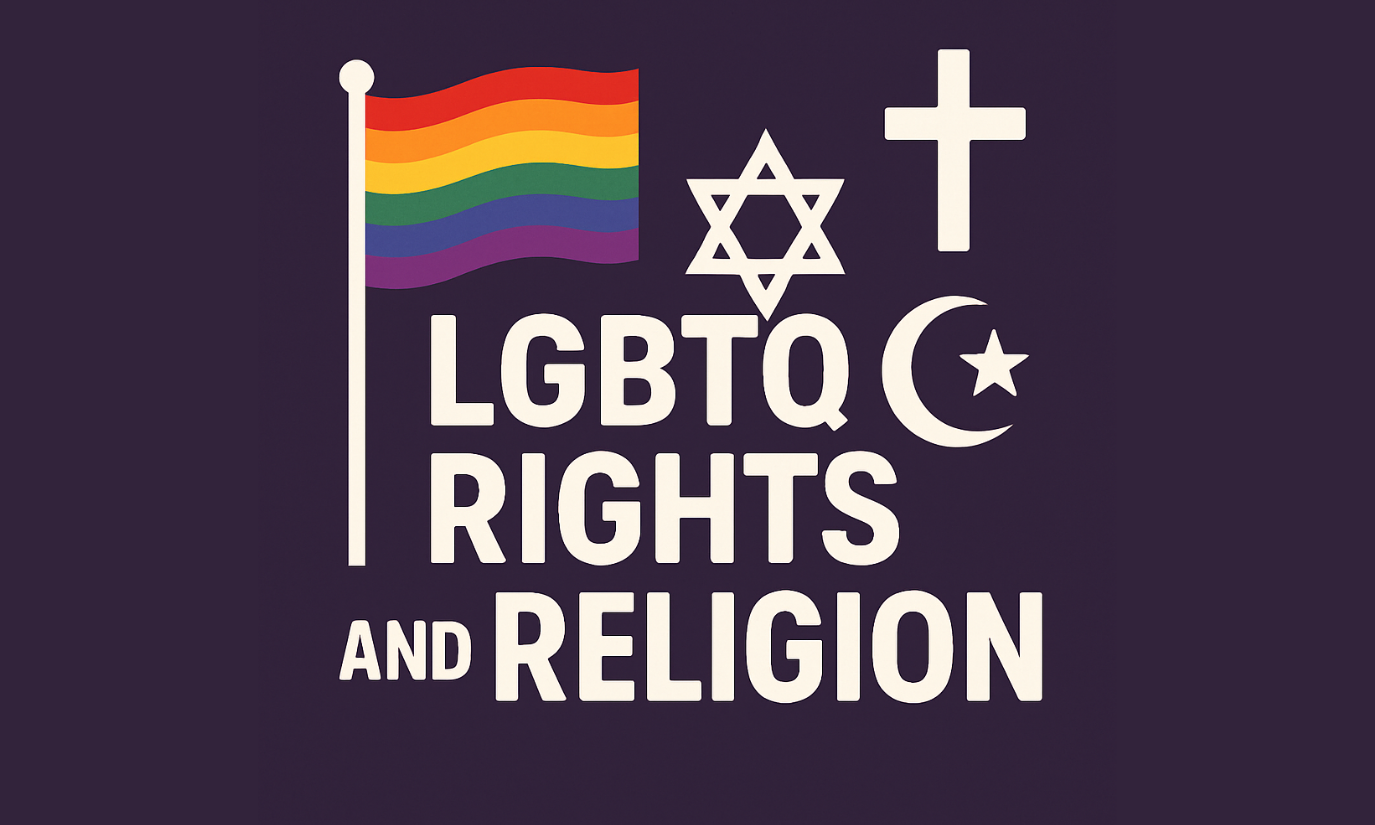Drs. Chana Etengoff, Landon Schnabel, and Joanna Wuest were 2024-2025 PRRI Public Fellows studying the intersection of politics, religion, and LGBTQ rights. This Spotlight Analysis details the findings of their original, collaborative project conducted with support from PRRI.
Chana Etengoff, Ph.D., Joanna Wuest, Ph.D., and Landon Schnabel, Ph.D. — 2024-2025 PRRI Public Fellows researching the intersection of religion and LGBTQ rights — came together across disciplines to create a podcast episode unpacking how Americans understand and engage with LGBTQ rights. Through three compelling segments, they examine emerging adults’ responses to religiously based service refusals, Gen Z men’s attitudes toward transgender health care, and the public’s divergent views on sexual versus gender diversity — revealing a society in the midst of complex and, at times, uneven change.
Emerging Adults, Religious Refusals, and the Shifting Landscape of LGBTQ Rights
In the first segment, Etengoff shares her analysis of PRRI survey data on young Americans’ views on LGBTQ rights. She highlights the striking finding that, among several LGBTQ-related issues, emerging adults have consistently expressed the strongest opposition against preventing religiously based service refusals. Tyler Lefevor, Ph.D. (2021-2023 PRRI Public Fellow, Utah State University), joins Etengoff to reflect on the developmentally unique stage of emerging adulthood and how views on LGBTQ rights may continue to shift as individuals move into later life stages such as parenthood. They also discuss how religion can function as both a source of stress and resilience for LGBTQ individuals.[1]
Transgender Rights in Precarious Times
In the second segment, Wuest talks with Kelsy Burke, Ph.D., a former PRRI Public Fellow (2022-2024) who is currently writing a book exploring anti-transgender attitudes. Together, they explore trends in public opinion data and ask why Americans have become steadily less receptive toward certain LGBTQ rights, especially those concerning access to transgender health care. They focus especially on the attitudes of Generation Z men, and why calling fights over trans rights a “cultural war” is a misnomer.
The Great Divide: Why Americans Support Same-Sex Marriage but Reject Gender Diversity
In the third segment, Schnabel, a sociologist, examines how Americans view two related but distinct issues: sexual diversity and gender diversity. About two-thirds of Americans now support same-sex marriage, while roughly the same proportion believes there are only two genders. Using PRRI’s 2023 Gender and Politics Survey, Schnabel maps Americans into four groups and finds that the largest — more than one in three Americans — supports sexual diversity but draws the line at gender diversity. Religion is also implicated in this divide. This pattern reveals how social change unfolds unevenly even across related issues and reflects a three-stage process of similarity, distinction, and adaptation. Schnabel explains that visibility matters and highlights the different stages of the social change process:
While over 80% of Americans know someone who is gay, lesbian, or bisexual, just one-third who know someone who is a gender minority.
These trends, like many areas of social change, reflect a society in transition rather than a fixed reality.
– “The Border Informs My Faith”: Oral History Methodologies and Understanding Immigration Politics Among People of Faith in Arizona
– Americans’ Responses to Abortion’s Uncertain Legal Landscape
– Democracy Today: Insights on Race, Religion, and Democratic Principles
– Why Are All the Black Christians Choosing to Go to Church Together?
[i] Emerging Adults, Religious Refusals, and the Shifting Landscape References:
- Arnett, J. J. (2000). Emerging adulthood: A theory of development from the late teens through the twenties. American Psychologist, 55(5), 469-480. https://doi.org/10.1037//0003-066X.55.5.469
- Chen, X., Liu, J., Luo, Y. J., & Feng, C. (2023). Brain systems underlying fundamental motivations of human social conformity. Neuroscience Bulletin, 39(2), 328-342. https://doi.org/10.1007/s12264-022-00960-4
- Etengoff, C., & Daiute, C. (2014). Family members’ uses of religion in post–coming-out conflicts with their gay relative. Psychology of Religion and Spirituality, 6(1), 33, https://doi.org/10.1037/a0035198
- Graham, J., Haidt, J., Koleva, S., Motyl, M., Iyer, R., Wojcik, S. P., & Ditto, P. H. (2013). Moral foundations theory: The pragmatic validity of moral pluralism. In P. Devine & A. Plant (Eds.), Advances in experimental social psychology (pp. 55-130). Academic Press. https://doi.org/10.1016/B978-0-12-407236-7.00002-4
- Lefevor, G. T., Etengoff, C., Davis, E. B., Skidmore, S. J., Rodriguez, E. M., McGraw, J. S., & Rostosky, S. S. (2023). Religion/spirituality, stress, and resilience among sexual and gender minorities: The religious/spiritual stress and resilience model. Perspectives on Psychological Science, 18(6), 1537-1561. https://doi.org/10.1177/17456916231179137
- Stallen, M., & Sanfey, A. G. (2015). The neuroscience of social conformity: Implications for fundamental and applied research. Frontiers in Neuroscience, 9, 1-5. https://doi.org/10.3389/fnins.2015.00337







